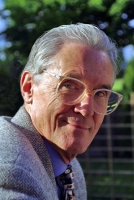
Year Born: 1929
George Robertson was born in Vancouver on June 27th, 1929. While he was studying at UBC in the late 1940s, his work with Earle Birney’s Creative Writing class generated a radio play that was produced by CBC Vancouver, and he had a short story published in Northern Review. Thus was the stage set for what was to be a notable career for George as a writer, and later as a radio producer and then an exceptional producer of television series and documentaries.
After graduating from UBC in 1950, George was recommended for a post-graduate fellowship in the Creative Writing Workshop at the State University of Iowa. In 1951 he retuned to Canada, and spent eighteen months in Ottawa as a writer with the National Film Board. He returned to Vancouver in 1953, and eventually became a radio producer with the CBC. Over the next four years he directed several jazz and comedy shows, including Jazz Workshop and Hotel Downbeat, and such drama series as Don Quixote and The Amateur Gentleman.
His writing and narration of a radio documentary, The Yukoners, brought his work to the attention of Allan King; King later produced one of his first films, The Yukoner, which was inspired by George’s production, and later he and George became close friends and professional colleagues. In 1957, after writing and narrating another Allan King documentary, Pemberton Valley, and producing for CBC Radio a ninety-minute musical adaptation of The Wind in the Willows under the title Toad of Toad Hall, George took off for England for nearly three years.
While there, he wrote a four-part radio series for CBC Vancouver, McGregor of Scotland Yard, and wrote and narrated two documentaries that Allan King had been commissioned to produce by Ross McLean for Close-Up. One of these, Rickshaw, won the Leipzig International Prize for best film documentary in 1961 and later First Prize at the Vancouver International Film Festival.
In 1960, George returned to the CBC in Vancouver, and stayed there for several years as a television producer. During that time, his output included several documentaries for the network series Explorations and Here And Now, as well as a one-hour documentary for the Religious Affairs Department in Toronto, titled The Journey, which included a short clip of a very young pastor in Calgary named Preston Manning. This production won George a Wilderness Award. He also produced variety shows, among them A Show Called X, with Patrick Rose, Eve Smith and Doug Parker’s band, and an interview-plus-music series called Night Beat.
His interest in doing classical music for TV was reflected in a recital by two noted European musicians, Michel Podolski, lutenist, and Christianne van Acker, mezzo soprano, who were touring Canada; Haydn’s Middle Years, a studio production with the CBC Vancouver Chamber Orchestra conducted by the English conductor Harry Newstone; and finally a production of Benjamin Britten’s Nocturne, with the same orchestra conducted by the composer and featuring Peter Pears as soloist.
In 1967, George wrote and directed Night Music, a half-hour drama starring Jackie Burroughs and Terence Kelly, and wrote the original script for a CBC/NFB co-production of the feature film Waiting For Caroline. After a sabbatical year in England, 1968-69, he returned to Canada and to Ottawa as executive producer of CBC’s current affairs series Something Else.
George moved to Toronto in 1971. After producing the first two programs in the CBC historical series Images of Canada – The Craft of History and Heroic Beginnings – he transferred to Current Affairs in 1972, as executive producer first of the Weekend series, and then in 1973 of its successor, Up Canada.
In the ensuing years, George produced for the CBC a portrait of a remarkable Russian femme fatale -Moura, Citizen Baroness (1974), was Executive Producer of The Canadian Culture Hunt series (and producer of the first episode, The Politics of Culture in1976), and wrote and directed a documentary about Pierre Trudeau’s contentious relationship with journalists, The Press and the Prime Minister (1977), as well as several half-hour documentaries for the Man Alive series.
In the early 1980s, George produced several more documentaries, including one on the unhappy fate of Canada’s remarkable fighter aircraft, the Avro Arrow, entitled There Never Was an Arrow; a light-hearted look at Canadian inventive genius, Eureka Eh?; Air Wars (about broadcasting, not airplanes); and Women at War, about the generation of Canadian women who served in the armed forces in World War II. From 1984 until his well-earned retirement in 1989, George Robertson was a producer for the CBC’s “fifth estate” series, specializing in short documentary stories.
